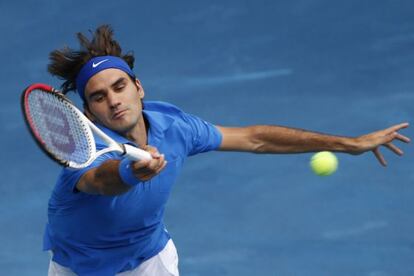Resurgent Federer demotes Nadal
Spaniard down to third in world after Swiss star wins acrimonious Madrid blue-clay tournament

Roger Federer continued a sparkling first half of the season by lifting the Madrid Open trophy on Sunday evening. The 2009 champion recovered from a set down to win a hard-fought match against Tomas Berdych 3-6, 7-5, 7-5.
The Swiss maestro has now claimed four titles so far this year and, despite the surface in the Caja Mágica this year being anything but a traditional clay court, he will have noted with some satisfaction ahead of Roland Garros that Rafael Nadal and Novak Djokovic are each far from firing on all cylinders.
Nadal lost in the third round to compatriot Fernando Verdasco in a heated contest during which the controversial blue clay was as much a protagonist as the two players. Nadal slipped during his customary pre-start jig to the baseline, drawing a rueful smile; later Verdasco, who was competing against his own combustible temperament as well as his opponent, skidded across court on a retrieval, performed a sardonic dance on the much-berated surface and punched a courtside clock in a fit of pique. But the real hammer blow to clay-court king Nadal was delivered Sunday by Federer, who in victory also robbed the Mallorcan of the number two ranking.
Glimmer of hope for girls?
Once again, Spain failed to provide a contestant in the last eight of the women's draw in Madrid, where no local player has ever been beyond the last 16. This year, Anabel Medina was the only homegrown talent still active on Thursday but Spain's highest-ranked player lost to American qualifier Varvara Lepchenko. It seems there is not a lot to cheer in Spanish women's tennis at present, especially after the Fed Cup team dropped out of the top tier in April. However, out on court three on Sunday a young player from Ávila gave spectators a glimpse of the future: top seed Paula Arias won the junior event by defeating Lucía Cortez 6-0, 6-2 in the final, a scoreline made even more eye-catching by the fact that Arias dropped just one game in three matches beforehand.
The Swiss was unflappable as ever during his semifinal against Janko Tipsarevic, easing to victory in two comfortable sets to oust the Serb, who had caused the upset of the week in dispatching his countryman Novak Djokovic on Friday night. The change to the Madrid tournament's courts, which Nadal made plain earlier in the week is detrimental to Spanish interests, suits Federer perfectly. The 16-times Grand Slam champion has never been the Caja Mágica's greatest fan due to the effect of altitude and heat on the behavior of the ball.
But with the current courts as close to hard as to clay, Federer was in his element throughout the week. Berdych put up a valiant fight in his effort to claim a first Masters title but there was a sense of inevitability that this would be Federer's tournament when both Nadal and world number one Djokovic made earlier-than-expected exits.
Federer now has 20 ATP Masters titles to his name, matching Nadal's career haul. More importantly, the number two ranking means that Nadal will now step into the Swiss' shoes as Djokovic's projected semifinal opponent until such time as the Spaniard can claw the spot back.
This will serve Federer well in Rome, the next major stop on the ATP Tour, where he was a losing finalist in 2003 and 2006. Since 2005 Nadal and Djokovic have converted the tournament in Italy's capital into their own personal Coliseum but at least one of them will not be in the final this year.
Federer may well be waiting on the other side of the net. After a week of players turning the air blue on Madrid's experimental courts, a volte-face by the ATP may be required before another Spanish red letter day is etched onto the clay of the capital.
Tu suscripción se está usando en otro dispositivo
¿Quieres añadir otro usuario a tu suscripción?
Si continúas leyendo en este dispositivo, no se podrá leer en el otro.
FlechaTu suscripción se está usando en otro dispositivo y solo puedes acceder a EL PAÍS desde un dispositivo a la vez.
Si quieres compartir tu cuenta, cambia tu suscripción a la modalidad Premium, así podrás añadir otro usuario. Cada uno accederá con su propia cuenta de email, lo que os permitirá personalizar vuestra experiencia en EL PAÍS.
¿Tienes una suscripción de empresa? Accede aquí para contratar más cuentas.
En el caso de no saber quién está usando tu cuenta, te recomendamos cambiar tu contraseña aquí.
Si decides continuar compartiendo tu cuenta, este mensaje se mostrará en tu dispositivo y en el de la otra persona que está usando tu cuenta de forma indefinida, afectando a tu experiencia de lectura. Puedes consultar aquí los términos y condiciones de la suscripción digital.








































